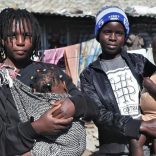Mozambique: Health workers call for replacement of government representatives
Almost half of Mozambican girls are married before the age of 18 – NGO

Forty-eight percent of Mozambican girls marry before the age of 18, a situation exacerbated by the poor implementation of legislation, a program officer at the Civil Society Forum for Children’s Rights has told Lusa.
“This unfortunate data shows that urgent action is needed,” says Mwema Uaciquete, highlighting poverty, high rates of illiteracy and cultural habits as the main causes of early marriage in Mozambique.
In more remote areas, women’s participation in decision-making is still a challenge, and the government has adopted inclusion policies such as access to education in response to the situation.
But tradition legitimizes early marriages in some provinces to the extent of girls being promised to a man for several reasons, including the payment of a debt or as a price for services provided by a traditional doctor.
To Uaciquete, reality in the most isolated areas demonstrates that girls without education are the most likely to marry early, a situation that she says requires action from the government to expand education into these districts.
“The situation is much more complex in rural areas,” Uaciquete explains, noting that over 40 civil society organizations have created a coalition caled CECAP (Coalition for Elimination of Premature Marriages) to address the matter.
Data shows that Nampula and Cabo Delgado provinces in the north and Manica in the centre of the country are the worst culprits, with early marriage rates of 62 percent, 61 percent and 59 percent respectively.
The adoption in December 2015 of a national strategy to combat early marriage is a step in the right direction, but the government needs to ensure the strategy is implemented, Uaciquete says.
“We need to ensure that early marriage laws are applied,” she concludes, inviting more civil society organizations to join the fight.












Leave a Reply
Be the First to Comment!
You must be logged in to post a comment.
You must be logged in to post a comment.